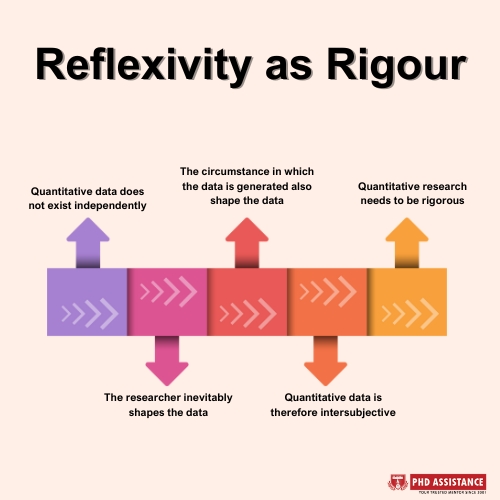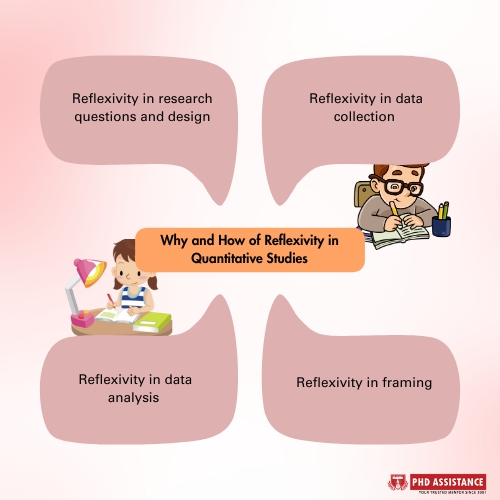Why and How of Reflexivity in Quantitative Studies
Introduction
Reflexivity is a concept that is primarily associated with qualitative research methods but can also be relevant in various other disciplines and research approaches. It refers to the process by which researchers acknowledge and critically reflect upon their roles, assumptions, biases, and subjectivity throughout the research design process. Reflexivity is particularly important in qualitative research because it recognizes that researchers are not impartial observers but active participants in the research process.

Reflexivity in Quantitative Studies
Reflexivity in quantitative studies refers to the awareness and consideration of the researcher’s potential biases, assumptions, and subjectivity when designing, conducting, and interpreting quantitative data in statistics research. While the reflexivity section in the dissertation is often associated with qualitative research, it is also relevant in quantitative research, albeit slightly different.
Here are some key aspects of reflexivity in quantitative studies: 1) Researcher Positionality and methodological Choices, 2) Data Collection and interpretation, 3) Reflexive Writing, 4) Peer Review and Validation, 5) Mixed Methods Approach
Reflexivity in quantitative studies involves acknowledging and addressing the researcher’s potential biases, assumptions, and subjectivity throughout the research process. While quantitative data analysis research aims to be as objective as possible, it is essential to recognize that no research is entirely free from subjectivity. Being transparent about these factors and taking steps to minimize their impact helps improve the rigour and credibility of quantitative research.
- Check out our sample reflexivity in qualitative research example to see how Quantitative data analytics is obtained.

Implementing Reflexibility During the Research Process
Implementing reflexivity in quantitative research during research is paramount for robust and insightful investigations. Reflexivity is crucial in research, requiring researchers to scrutinize their biases, assumptions, and preconceptions. This introspective practice ensures the validity and credibility of findings, fosters empathy, and allows for the adaptation of methodologies. It also promotes transparency, enhancing peer review and enhancing the quality of scholarship.
- Reflexivity in research questions
Identifying a gap in the existing literature and creating a study to address this gap is a popular strategy for formulating and answering quantitative research questions. There are valuable guiding principles that might assist researchers in identifying an appropriate study issue.
How Reflexivity in Research Questions?
For example, in a recent work led by one of the writers of this commentary (Pownall et al., 2021), each author on the writing team drafted a positionality statement on the issue at hand and utilized this to define the writing method. These individual articulations of positionality were then reduced and molded, leading to a final positionality consensus that was included in the final document to orient readers to the collective writing team’s viewpoint. With this in mind, they contend that being open about one’s opinions, prejudices, goals, and lenses may result in a richer, more contextualized final output.
- Reflexivity in data collection
For many research theories of knowledge, incorporating reflexivity in qualitative research examples may help the data-gathering stage. Researchers can think about the theoretical, intellectual, and political viewpoints that shape the study at this stage, when these issues may be practical and tangible.
How is Reflexivity in data collection?
By framing the research paper to participants (e.g., see Harper, 2020), researchers may increase the probability of ‘finding’ their predicted outcome (see our data analysis section for a more in-depth explanation of such confirmation biases). While this may not be harmful in and of itself, such behaviours present an excellent chance for meaningful reflective engagement. Remember the question “what is the research process, and how am I influencing it?” (Lazard & McAvoy, 2020) is the cornerstone of the reflexivity statement and can give a valuable query to steer the data gathering process.
- Reflexivity in data analysis
The intelligent data analysis in big data helps in quantitative research and interpretation phase of the research process is perhaps the most apparent location to include reflexivity.
How Reflexivity in Data Analysis?
For example, keeping extensive, careful, reflective field notes is a gold-standard practice in qualitative research (see Phillippi & Lauderdale, 2018). Field notes, which may be employed as an analytical tool, provide a beneficial area for ‘critical reflection’ throughout the research process. In their discussion of best practices in field notes, Phillippi and Lauderdale (2018) describe how ‘qualitative research recognizes the role of the researcher as an instrument inside the research, altering the outcomes’ and use this as justification for note-keeping.
- Check out our study guide to learn more about How to Write a Research Design – Guide with Examples.
Conclusion
In conclusion, reflexivity in quantitative studies is a critical yet often overlooked aspect that deserves more attention from researchers. By acknowledging the subjectivity inherent in the research process and actively engaging in self-awareness, researchers can enhance the validity and reliability of their findings. Understanding why reflexivity in sociology matters, as it allows us to identify and mitigate potential biases, is crucial for producing robust quantitative research.
The “how” of reflexivity involves implementing practical strategies, such as transparent documentation of research decisions and embracing research methodology pluralism when appropriate. Researchers should also continuously reflect on their own perspectives and assumptions to minimize bias and enhance the credibility of their work.
About PhD Assistance
PhD Assistance is an expert in providing the best statisticians to work on, from the development of tools to analysis and interpretation of results with the professional presentation of the obtained data. We assist PhD candidates in developing tools, data collection, and statistical analysis using expert software like AMOS, PLS LISTERS, SAS, and SPSS. They offer training courses, video conferences, and expert statisticians to help with problem-solving and understanding concepts.
References
- Jamieson, Michelle K., Gisela H. Govaart, and Madeleine Pownall. “Reflexivity in quantitative research: A rationale and beginner’s guide.” Social and Personality Psychology Compass(2023): e12735.
- Pownall, M., Talbot, C. V., Henschel, A., Lautarescu, A., Lloyd, K. E., Hartmann, H., Darda, K. M., Tang, K. T. Y., Carmichael-Murphy, P., Siegel, J. A., & Siegal, J. (2021). Navigating open science as early career feminist researchers. Psychology of Women Quarterly, 45(4), 526–539.
- Harper, C. A. (2020). Ideological measurement in social and political psychology. PsyArXiv.
- Phillippi, J., & Lauderdale, J. (2018). A guide to field notes for qualitative research: Context and conversation. Qualitative Health Research, 28(3), 381–388.
 Previous Post
Previous Post Next Post
Next Post
